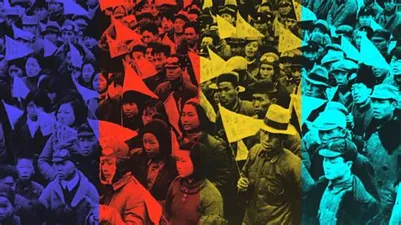
Taiwan’s President Tsai Ing-wen conducted two “transit” stops at the United States during her visit to a few of the island nation’s diplomatic allies, Guatemala and Belize, in Central America from March 29 to April 7. Tsai’s transit period caught major headlines and reflected on Tsai’s continuous policy to interact with foreign lawmakers. Preceding President Tsai’s visit to the partners in the region, Honduras recalled its diplomatic relationship with Taiwan and announced switching the relation to China. However, the switch of diplomatic ties is not linked to the Tsai visit. Honduras’ switch brought down Taiwan’s diplomatic allies to only 13.
On her way to Central America, Tsai stopped in New York City from March 29-31. During this time, Tsai met with US senators who voiced their support for greater participation for Taiwan in international forums, as well as other officials from Taiwan’s diplomatic allies of Eswatini and the Marshall Islands. On her return, Tsai stopped in Los Angeles from April 4-6. The second leg of Tsai’s transit irked China when Kevin McCarthy, the US House of Representatives Speaker, met with Tsai. During the joint remarks by the two Tsai warned of “democracy being under threat”, while McCarthy reiterated the “friendship between the people of both nations being of profound importance, and it is important to maintain economic freedom, peace, and regional stability”.
Such “transit diplomacy” is one way Taiwan’s leadership gets to interact with leaders in the US and the Taiwanese diaspora. In the past, such transit visits did cause a stir in cross-strait and US-China relations.
China’s response
China quickly opposed the meeting, blamed US and Taiwan leaders for not withholding the peace and warned of “severe consequences”. While China’s Foreign Ministry Spokesperson blamed the US for not respecting China’s interests and supporting “separatist forces”. The Chinese Embassy in the US issued a statement which mentioned that Taiwan is a “core interest for China and bedrock for the bilateral relationship between US-China, and the redline should not be crossed”.
China’s Ministry of National Defense responded by conducting a “Joint Sword” military exercise around Taiwan from April 8 to 10. The ministry spokesperson stated that the Chinese forces will “resolutely crush separatist attempts for Taiwan’s independence and foreign interference in any form”. The military drill led to the closure of the airspace in Northern Taiwan for 27 minutes, than the original three days as planned earlier. It also announced that its Navy would inspect cargo from the ships transiting the Taiwan Strait.
Such response sharply contrasted with post-Nancy Pelosi’s (predecessor to Kevin McCarthy) visit to Taipei in August 2022. The Chinese reaction was quite strong, leading to live military drills around Taiwan’s mainland and missile fires that also landed in Japan’s Exclusive Economic Zone. Economically, China also banned over 2000 products from Taiwan.
The military drills reflected the Chinese army’s capability of creating a “blockade” at their will in and around Taiwan. The fact that such exercises have led to the closure of Taiwan’s airspace and seaports which is crucial to its economic engagement with the world has stirred up the debate domestically on whether such visits and meetings with US officials are helpful more harmful to themselves.
Domestic Response to High-Profile Meetings
Such visits not only bring Taiwan to notice but also helps its domestic audience to be assured of gaining support from major regional powers, who could defy China’s threats and visit Taiwan. The current ruling party of Taiwan Democratic Progressive Party (DPP) reflects such high-profile meetings are crucial for increasing the voice of Taiwan. Under President Tsai’s leadership, it has not acknowledged the “1992 consensus”, which was agreed upon between the leaders of Taiwan and China. The “1992 consensus”, which calls for “there is One China but does not clarify who is the sole representative of China”, has formed one of the prerequisites that China demands that Taiwan’s leadership acknowledge.
The domestic response to such meetings shows a clear indication of dividends among the opinions of the Taiwanese public. Brookings’s commentary, “When might US political support be unwelcome in Taiwan?” which got updated on April 6, 2023, reflected Taiwan public opinion on Pelosi’s visit to Taiwan. As per the survey result, a total of 70.5 per cent of Kuomintang (KMT), 70.1 per cent of the Democratic Progressive Party (DPP), and 67.3% of independents supporters responded Pelosi’s visit being “very serious and serious” to the question of “Were China’s military exercises after Pelosi’s visit a serious threat to Taiwan security?”
In contrast, Kuomintang (KMT) is seen as one which reflects on increasing ties and avoiding any sort of moves which might anger Beijing. Post-Pelosi visit to Taiwan, KMT’s Vice Chairman Andrew Hsia visited China, citing a pre-planned trip unrelated to Pelosi’s visit. Though the visit was focused on meeting the Taiwanese business community in China, popularly known as Taishang, it drew anger from the public. Similarly, post-Tsai’s trip to Central America, former President (2008-2016) Ma Ying-jeou of the KMT party visited China on behalf of the Ma Ying-jeou Foundation and not representing KMT. The visit saw KMT again being spotlighted, where it was seen as a party sympathetic to China.
In another poll by the Taiwanese Public Opinion Foundation (TPOF), about 61% of the respondents approved the meeting between McCarthy and Tsai, whereas 21.8% disapproved. Whereas Ma Ying-jeou’s trip saw only 39.2% approval in contrast to 43.7% opposing it.
With the upcoming Presidential elections in 2024, the DPP and KMT are skeptical about their moves, and both major parties are treading carefully in the election campaigns. The recent win by KMT in the local “9-in-1” election gave hope for the party to see such a change in the national polls. Though, the 2024 election will see another challenge: Taiwan’s People’s Party (TPP) led by former Taipei Mayor (2014-2022) Ko Wen-je, hoping to give an alternative to the Taiwanese voters to the two mainstream parties.
China quickly opposed the meeting, blamed US and Taiwan leaders for not withholding the peace and warned of severe consequences. While China’s Foreign Ministry Spokesperson blamed the US for not respecting China’s interests and supporting separatist forces.

Dr. Manoj Kumar Panigrahi is an Assistant Professor and Director of the Centre for Northeast Asian Studies at Jindal School of International Affairs, O.P. Jindal Global University.